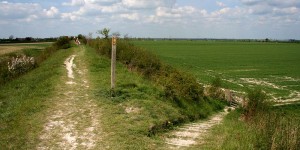The Devil’s Ditch, Song 21, ll. 1-43
The Devil’s Dyke or Devil’s Ditch in Cambridgeshire is one of several ancient earthworks in England to bear this sinister name. Thought to have been built by the Anglo-Saxons, the raised bank and accompanying ditch run for more than seven miles between the villages of Woodditton and Reach. As Drayton notes, it was known in the Middle Ages by the holier name of Saint Edmund’s Dyke. The name “Devil’s Dyke” seems to come from local folklore. One story tells how the devil carved the ditch with his tail, in anger at having been turned away from a wedding in Reach.
In the eighteenth and nineteenth centuries, many old earthworks of this kind were ploughed under by farmers bent on improving their fields. The Devil’s Ditch remains, and has in recent years been under the particular care of the Devil’s Dyke Restoration Project.
By this our little rest, thus having gotten breath,
And fairly in our way, upon Newmarket Heath
That great and ancient * ditch, which us expected long,
Inspired by the muse, at her arrival song:
O time, what earthly thing with thee itself can trust,
When thou in thine own course, art to thyself unjust!
Dost thou contract with death, and to oblivion give
Thy glories, after them, yet shamefully dar’st live?
O Time, had thou preserved, what labouring man hath done,
Thou long before this day, mightst to thyself have won
A deity with the gods, and in thy temple placed,
But sacrilegious thou, hast all great works defaced;
For though the things themselves have suffered by thy theft,
Yet with their ruins, thou, to ages mightst have left,
Those monuments who reared, and not have suffered thus
Posterity so much, t’abuse both thee and us.
I, by th’ East Angles first, who from this heath arose,
The long’st and largest ditch, to check their Mercian foes;
Because my depth and breadth so strangely doth exceed
Men’s low and wretched thoughts, they constantly decreed
That by the Devil’s help I needs must raised be,
Wherefore the Devil’s Ditch they basely named me;
When ages long before, I bore Saint Edmund’s name,
Because up to my side (some have supposed) came
The liberties bequeathed to his more sacred shrine.
Therefore my fellow dykes, ye ancient friends of mine,
That out of earth were raised, by men whose minds were great,
It is no marvel, though oblivion do you threat.
First, * Flemditch next myself, that art of greatest strength,
That doest extend thy course full seven large mile in length,
And thou the * Fivemile called, yet not lesse dear to me,
With * Brenditch, that again is shortest of the three,
Can you suppose yourselves at all to be respected,
When you may see my truth’s belied and so neglected?
Therefore dear heath, live still in prosperous estate,
And let thy well-fleeced flocks, from morn to evening late,
(By careful shepherds kept) rejoice thee with their praise;
And let the merry lark with her delicious lays four.
Give comfort to thy plains, and let me only lie,
(Though of the world condemned) yet gracious in thine eye.
Thus said, these ancient dykes neglected in their ground,
Through the sad aged earth sent out a hollow sound,
To gratulate her speech

